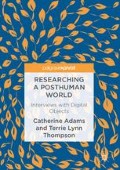Abstract
In our final chapter, we consider five posthuman or digital confluencies that have come to matter in today’s professional work and learning practices, paying particular attention to the work of researchers: developing a posthumanist ethic; anticipating changes to our thinking, being, and doing; reckoning with the deskilling and upskilling of work practices; dealing with digital data; and questioning digital politics. We suggest that our heuristics can play a key role in addressing some of these new professional responsibilities, some of which may have far-reaching ethical, political, social, and policy implications.
Access this chapter
Tax calculation will be finalised at checkout
Purchases are for personal use only
References
Adams, C. (2014). What’s in a name? The experience of the other in online classrooms. Phenomenology & Practice, 7(2), 51–67. https://ejournals.library.ualberta.ca/index.php/pandpr/article/view/22144/16463
Barad, K. (2003). Posthumanist performativity: Toward an understanding of how matter comes to matter. Signs: Journal of Women in Culture and Society, 28(3), 801–831. doi:10.1086/345321
Bogost, I. (2012). Alien phenomenology, or what it’s like to be a thing. Minneapolis: University of Minnesota Press.
Denzin, N.K. (2013). The death of data?. Cultural Studies – Critical Methodologies, 13(4), 353–356. DOI: 10.1177/1532708613487882
Edwards, R. (2012). (Im)mobilities and (dis)locating practices in cyber-education. In R. Brooks, A. Fuller, J. Waters (Eds.), Changing spaces of education: New perspectives on the nature of learning (pp. 205–218). Abingdon: Routledge.
Ingold, T. (2000). The perception of the environment: Essays in livelihood, dwelling, and skill. Abingdon, UK: Routledge.
Introna, L. (2007). Maintaining the reversibility of foldings: Making the ethics (politics) of information technology visible. Ethics and Information Technology, 9(1), 11–25. doi: 10.1007/s10676-006-9133-z
Introna, L. D. (2016). Ethico-onto-epistemology: some reflections on performative epistemic practices. Paper presented at 4s/EASST Conference Barcelona 2016.
Kitchin, R. (2014, June 6). Rob Kitchin: “Big data should complement small data, not replace them.” [Weg log message]. http://blogs.lse.ac.uk/impactofsocialsciences/2014/06/27/series-philosophy-of-data-science-rob-kitchin/
Knox, J., & Bayne, S. (2013). Multimodal profusion in the literacies of the Massive Open Online Course. Research in Learning Technology, 21. doi: http://dx.doi.org/10.3402/rlt.v21.21422.
Latour, B. (1996). Aramis or the love of technology (trans: Porter, C.). Cambridge, MA: Harvard University Press.
Law, J. (2004). After method: Mess in social science research. Abingdon, UK: Routledge.
McLuhan, M., & McLuhan, E. (1988). Laws of media: The new science. Toronto, ON: University of Toronto Press.
Merleau-Ponty, M. (1962). Phenomenology of perception (trans: Smith, C.). New York: Routledge.
Mol, A. (2010). Actor-network theory: Sensitive terms and enduring tensions. Kölner Zeitschrift für Soziologie and Sozialpsychologie, 50(1), 253–269. http://hdl.handle.net/11245/1.330874
Ong, W.J. (2005). Orality and literacy: The technologizing of the word. London and New York: Routledge.
Paulus, T., Lester, J., Dempster, P. (2014). Digital tools for qualitative research. London: Sage.
Prinsloo, P., Archer, E., Barnes, G., Chetty, Y., van Zyl, D. (2015). Big(ger) data as better data in open distance learning. International Review of Research in Open and Distributed Learning, 16(1), 284–306.
Roden, D. (2015). Posthuman life: Philosophy at the edge of the human. Abingdon, OX: Routledge.
Savage, M. (2015). Sociology and the digital challenge. In P. Halfpenny, & R. Proctor (Eds.), Innovations in digital research methods (pp. 297–310). London: SAGE Publications.
Stiegler, B. (1998). Technics and time, 1: The fault of Epimetheus. Stanford, CA: Stanford University Press.
Thiele, K. (2014). Ethos of diffraction: New paradigms for a (post)humanist ethics. Parallax, 20(3), 202–216. doi: 10.1080/13534645.2014.927627.
Thompson, T.L. (2015b). Digital doings: Curating work-learning practices and ecologies. Learning, Media & Technology. doi: 10.1080/17439884.2015.1064957
Vlieghe, J. (2014). Education in an age of digital technologies Flusser, Stiegler, and Agamben on the idea of the posthistorical. Philosophy and Technology, 27(4), 519–537. doi: 10.1007/s13347-013-0131-x
Author information
Authors and Affiliations
Copyright information
© 2016 The Author(s)
About this chapter
Cite this chapter
Adams, C., Thompson, T.L. (2016). Posthuman Confluencies. In: Researching a Posthuman World. Palgrave Pivot, London. https://doi.org/10.1057/978-1-137-57162-5_5
Download citation
DOI: https://doi.org/10.1057/978-1-137-57162-5_5
Published:
Publisher Name: Palgrave Pivot, London
Print ISBN: 978-1-137-57161-8
Online ISBN: 978-1-137-57162-5
eBook Packages: Social SciencesSocial Sciences (R0)

